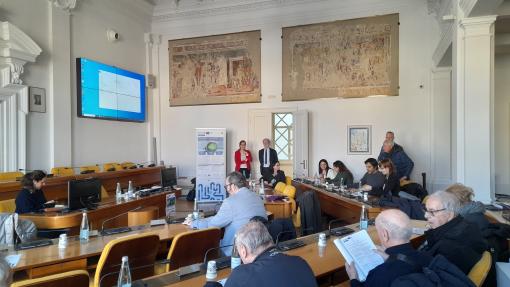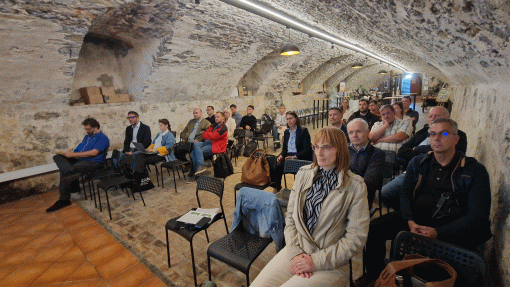
CO ADRIA
Policy objective: ISO 1 - A better cooperation governance
Typology: Standard project
Short description of the project: The CO ADRIA project tackles the common challenge of climate change in the Italy-Slovenia programme area, with the overall objective of contributing substantially to the attainment of climate neutrality by 2050 in line with European objectives. The overall objective of the project is to promote climate neutrality in the cross-border area through coordinated actions that help improve energy efficiency, reduce emissions and promote the deployment of renewables in key industries and by setting up a common structure. The expected change that the project will make to the current situation is that it will facilitate shared initiatives and help overcome cross-border administrative barriers in order to achieve climate neutrality through new approaches and behaviour. The project contains several innovative elements both in its strategic approach and in the actual solutions it intends to develop. First, the setting up of the EGTC promotes a truly cross-border cooperation model, bringing together Italian and Slovene partners in a joint structure empowered to act on both sides of the border and that could be further enlarged in the future to include other adjacent countries outside the programme area. Furthermore, the project will test energy management models on a cross-border scale, with the active engagement of local communities in the definition of priorities and actions for energy transition. Pilot actions will be implemented and future cross-border energy communities, where users will play an active role in energy generation and management, will be tested for viability. The main outputs of the project are: i) a strategic cross-border collaboration network among all PPs for the achievement of climate neutrality in the EU by 2050 and the preparation of all the necessary documentation to set up an EGTC, providing a unified and high level cross-border governance instrument to address the climate neutrality concerns shared by all PPs; ii) two action plans: the first plan shall include climate change response measures and actions, a review of best practices and successful adoption of the EU’s Mission on Climate Change Adaptation common measures; the second action plan shall include a roadmap for the soon-to-be EGTC on the initiatives for the creation of energy communities that may also envisage the use of hydrogen; iii) joint cross-border information events aimed at enhancing civil servants' competencies and helping the population to recognise the importance of territorial cooperation, as well as environmental and climate issues. The project results are: i) the cross-border cooperation network shall be institutionalised in the form of an EGTC that will act as a hub for cooperation on climate neutrality in the area; ii) the adoption of joint energy efficiency action plans and innovative energy solutions in the cross-border area; iii) the participation in joint training and information initiatives for the promotion of climate neutrality in the Programme Area, to be initially organised within the project and by the EGTC after project conclusion. There are several beneficiaries of the project outputs and results. Local partner authorities will improve their competencies on energy and climate issues and therefore their ability to plan and implement sustainable local policies. Businesses and SMEs in the area will be involved in pilot actions and develop sustainable energy solutions. The local communities will become more aware and involved in energy community initiatives, taking an active role in the transition. The adoption of participatory approaches to the development of energy conversion projects and the creation of synergies will provide a replicable model of cross-border governance on sustainability issues and help achieve climate neutrality by 2050. Cross-border cooperation is mandatory as environmental and climate challenges spread across geographical or administrative boundaries and require a coordinated and joint effort by communities and partners located on both sides of the border. Furthermore, the sharing of knowledge, experience and good practices between Italian and Slovene partners will foster more effective solutions than what could be achieved by isolated actions at a local or national level.
- To promote climate neutrality in the cross-border area through the coordination of actions to improve energy efficiency.
- Reduce emissions and promote the use of renewable energy sources in key sectors by establishing a joint structure.
- The expected change that the project will bring to the current situation is the facilitation of shared initiatives, overcoming cross-border administrative barriers to achieving climate neutrality through new approaches and behaviour.
- A strategic network of cross-border collaboration of all PPs for the achievement of climate neutrality in the EU by 2050 through the drafting of all the necessary documentation for the establishment of an EGTC, in order to have a single and high level of cross-border governance on the issue of climate neutrality shared by all PPs.
- Two action plans: the first one with a set of measures and actions to be undertaken to provide a response to climate change and a comparison of best practices and adoption of joint measures of the EU Mission "Climate Change Adaptation" and the second one to provide a roadmap to the future EGTC on the initiatives to be implemented for the creation of energy communities also with the use of hydrogen.
- Joint cross-border (in)training actions to increase civil servants' skills and public awareness to promote the importance of territorial cooperation, as well as awareness-raising on environmental and climate issues.



